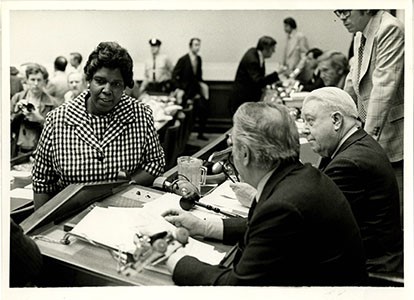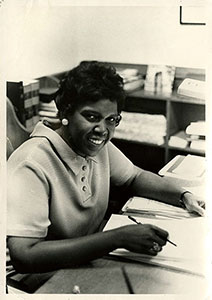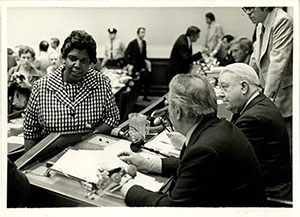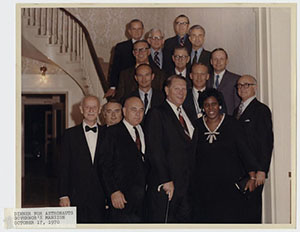New Items Available in the Barbara C. Jordan Archives Digital Collection


“I never wanted to be run-of-the-mill.” –Barbara Jordan1
Jordan at Texas Senate.
(Photo by uncredited photographer, 5” x 7”, black and white. ca. 1972. Courtesy of Texas Southern University Special Collections.)
First African-American woman in the Texas Senate. First African-American woman elected to the Legislature since 1883. First African-American woman from the South to be elected to U.S. Congress. These are just a few of the accomplishments documented in the Barbara C. Jordan Archives collection now available in The Portal to Texas History. This collection was made available by the Texas Southern University Special Collections and the University of North Texas Libraries’ digital collections.
Barbara Charline Jordan was born February 21, 1936 in Houston, Texas. She graduated from Texas Southern University with a degree in political science and later received her law degree from Boston University in
- She served her first term in the Texas Legislature in 1966, and in 1972, was elected to the United States House of Representatives where she served until 1979. Following her political career, Jordan joined the University of Texas at Austin as a professor and held the Lyndon B. Johnson Centennial Chair in National Policy. Known to be a “rigorous mentor and a dedicated professor,” Jordan accumulated many honors before her death in 1996 including thirty-three honorary doctorates and national awards, the Presidential Medal of Freedom, and the title “Role Model of the Century” in 1999 by Texas Monthly magazine.2
“Today we are not being petty, we are trying to be big because the task we have before us is a big one.”– From Jordan’s speech before the House Judiciary Committee, July 25, 1974.
Providing access to documents depicting the extensive and rich career of this American stateswoman has been no small task. In addition to photographs, The Portal to Texas History now contains materials from Jordan’s time in the Texas Senate, many of her speeches, and scrapbooks compiled from 1967 to 1980. The documents provide a behind-the-scenes look at Jordan’s drafting process including handwritten, teleprompter, and typed copies of her speeches. The collection has provided access to such famous compositions as “Civil Liberties: Inoperative? Inaudible? Unintelligible? Expletive Deleted?,” the speech given at Howard University’s Commencement on May 11, 1974 as she prepared for the Judicial Committee Hearing on the Impeachment of Richard Nixon; a draft of the famous Judiciary Committee Speech she gave on July 25, 1974, and her keynote address remarks at the Democratic National Convention in 1976.

Jordan at a Judiciary Hearing, #13. (Photo by Dev O’Neill, 6.5” x 8.5”, black and white. Courtesy of Texas Southern University Special Collections.)

Dinner for Astronauts, Governor’s Mansion, October 17, 1970. (Photo by uncredited photographer. [Barbara Jordan Scrapbook, July-October, 1970], Sequence 79, https://texashistory.unt.edu/ark:/67531/metapth616618/, University of North Texas Libraries, The Portal to Texas History. Crediting Texas Southern University, Houston, Texas.)
Inside each of the 37 scrapbooks are correspondence, newspaper clippings, and photos documenting Jordan’s statements, engagements, and accomplishments. Some examples include this article paying homage to the astronauts of the first lunar landing and the news feature “‘Black Rose’ of Texas Not Awed by Historic Role.” Viewers of this part of the collection will be able to get a sense of the culture and media representation of the late 1960’s and 70’s.
These materials were digitized with grant funding through a Rescuing Texas History mini-grant awarded by UNT in 2013 and another grant awarded by the Tocker Foundation in 2014.The digital Barbara C. Jordan Archives collection now includes nearly two thousand items and is expected to grow as further funding is secured. Efforts to acquire grants to digitize more material recording Jordan’s time in Congress, her correspondence, and photos are already under way. Meanwhile, digital collection visitors are encouraged to visit in person the physical items at Texas Southern University’s Special Collections.
Notes
- Francis X. Clines, “Barbara Jordan Dies at 59; Her Voice Stirred the Nation,” New York Times, January 18, 1996, http://www.nytimes.com/1996/01/18/us/barbara-jordan-dies-at-59-her-voice-stirred-the-nation.html.
- Max Sherman, ed., Barbara Jordan: Speaking the Truth with Eloquent Thunder (Austin, TX: University of Texas Press), 1.

